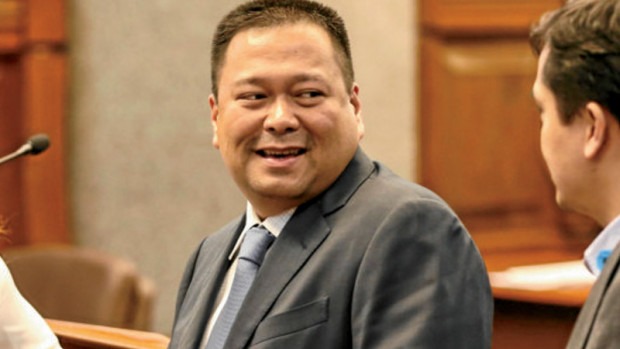Prosecutors appeal dismissal of JV Ejercito’s graft rap
State prosecutors appealed the dismissal of the graft case of Senator Joseph Victor “JV” Ejercito, who was cleared over the alleged anomalous use of calamity funds for the purchase of high-powered firearms when he was San Juan City mayor.
In a motion for reconsideration filed before the Fifth Division, the Office of the Special Prosecutor asked the Sandiganbayan to reverse its decision granting Ejercito’s demurrer to evidence, and maintained that the Ombudsman was able to prove that Ejercito gave unwarranted benefit to the firearms supplier HK Tactical Defense System Inc. (HKTDSI).
READ: Court dismisses graft rap vs JV Ejercito in firearms case
Prosecution said the HKTDSI submitted eligibility/pre-qualification documents in March 2008 already containing the project reference number, although this was only made available to the public on April 2008.
“It is clear then that the accused public officers gave unwarranted benefits, advantage and preference to HKTDSI by providing these details to the winning bidder one month before they were disclosed to the public,” the prosecutors said.
The prosecution said the court erred in not considering the fact that details for the firearms were already published although there was no request made to purchase firearms.
Article continues after this advertisementThe purchase request was approved by Ejercito on May 2008, although the invitation to apply for eligibility and to bid (IAEB) was published earlier or in April 2008.
Article continues after this advertisement“Since the purchase request was made only on May 22, 2008, what was the basis for the publication (of) the IAEB containing details of the firearms procurement on April 14, 2008? The city government of San Juan palpably put the cart before the horse in this case,” the prosecution said.
“The bidding was unmistakable rigged and the supporting paperwork, manufactured,” the prosecution added.
The court also failed to consider the fact that the purchase request and purchase order bore the same date, indicating that documents were prepared to manipulate the bidding process and to accommodate HKTDSI.
The prosecution said under the regular bidding process, the purchase request would have to be filled up first, and that a purchase order may only be issued after a contract is signed by the parties.
“Thus, the purchase order will necessarily be issued only after a lapse of a considerable period from the time the request was made. Unless the bidding process is manipulated, the purchase request and the purchase order will never bear the same date,” the prosecution said.
The prosecution also said the court erred in ruling that post-qualification may be done away with in cases of a lone bidder.
The prosecution said the court failed to cite a provision in Republic Act 9184 or the Government Procurement Reform Act that would allow lone bidders to be awarded a project without undergoing the post-qualification stage or the proceeding to verify and validate documents submitted by the bidder.
“A post-qualification report is sorely missing. The inevitable conclusion therefore is that no post-qualification was conducted,” the prosecution said.
Lastly, the prosecution said all the accused signed the bid documents which established their culpability in the rigged bidding process.
The prosecutors said Ejercito signed the contract for the purchase of the firearms and approved the purchase request, abstract of bids and the acceptance of quotation.
Ejercito’s signatures also appeared in the purchase order, IAEB, notice to proceed and notice of award.
Also, the accused Bids and Awards Committee members also signed the bidding documents such as the IAEB, certificate of registration of eligibility, minutes of the meeting of the pre-bid conference, purchase request, among others.
“Despite the patent irregularities in the procurement process, all of the accused consciously and willingly signed the above bidding documents to give unwarranted benefits, advantage and preference to HKTDSI,” the prosecution said.
In its 45-page resolution, the anti-graft court said the prosecution failed to prove Ejercito gave unwarranted benefit to the supplier to win the bid for the supply of Daewoo firearms and that there was no evidence to prove Ejercito specified or pre-selected the Daewoo brand.
The court also said the supplier HKTDSI’s certificate of eligibility to bid dated April 25, 2008 came a day ahead of the period for eligibility checking scheduled for April 26 to 28 because the rules allow bidders to register for eligibility ahead of the existence of any procurement project.
“The foreknowledge by HKTDSI of the results of the bidding is a matter which should not and cannot be traced to all the accused, simply because they are not the only people involved in the preparation of documents,” the court said.
“More importantly, the fact alone that HKTDSI was the only bidder should not evoke wonder or speculation about the result of the bidding,” the court added.
The graft case, or violation of Section 3(e) of the Anti-Graft and Corrupt Practices Act, stemmed from the allegedly anomalous procurement of high-powered rifles worth P2.1 million using the city’s calamity funds although the city was not under a state of calamity when Ejercito was San Juan mayor in 2008.
In the graft information, the Ombudsman prosecutors said the purchase of the firearms was done without public bidding and post-qualification and that the winning bidder submitted bid documents bearing dates earlier than the publication of invitation to bid, indicating that there was unwarranted benefit given to the supplier.
The firearms purchased included three units of model K2 cal. 5.56mm sub-machine guns and 17 units of Daewoo model K1 cal. 5.56 mm sub-machine guns. RAM
RELATED STORIES
